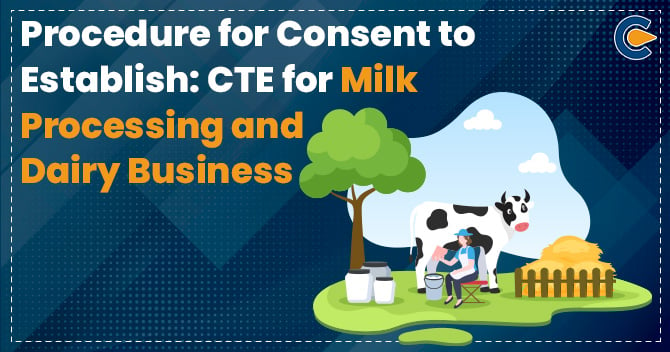Indian dairy businesses are contributing significantly to our country’s economy besides improving the health standards by increasing the nutrition value of food. India has the first position in the world in having a bovine population as it has a large number of cattle and buffaloes. As of 2020, the number of cattle and buffaloes in our country was 305,500 thousand, which accounts for 33.38% of the world’s cattle and buffaloes. India is the world’s highest livestock owner at about 535.78 million. It has millions of livestock with breedable cows and breedable buffaloes.
Presently, India is the second-largest milk-producing country in the world after the United States of America, i.e., it has the second-largest poultry market in the world and stands fifth in the population of camels. And so, India has the largest amount of Milk Processing and Dairy Business. This blog is dedicated to the Procedure for Consent to Establish any such businesses.
Things to know before starting Procedure for Consent to Establish
There are a few things to know before starting a procedure for Consent to Establish for Milk processing and Dairy business, and such things are as follows:
- Development of Business Plan and SWOT Analysis
A dairy farm is a business, so there is a need for a business plan and SWOT (Strengths, Weaknesses, Opportunities and Threats) analysis. The business plan must include a cash flow plan to set a reasonable expectation for expenses and the cost of production.
- Creation of Cropping and Feeding Program
If the business is going to feed a TMR (Total Mixed Ration), graze cattle or both, cattle at dairy require a specific set of nutrients to support themselves, produce milk and grow a calf. Work with a nutritionist in case of lactating cows and dry cows and heifers if raised on the farm.
- Creation of a Waste Management Plan
Dairy cattle produce manure, i.e., waste. If managed or used properly, this waste can be a great resource on the farm. Waste/manure management is tied closely to the cropping system and feeding program. A double cropping system allows to produce more feed but also allows to apply of more manure on the land of the farm. There are alternatives, too, such as composting and anaerobic digestion of manure.
- Build Equity
The dairy business requires a significant capital investment. Land, buildings, equipment, and cows are expensive, and only a few dairy farmers have the capital to purchase everything at the initial stage of their business.
- Dairy Farming is a Biological Systems
A dairy farm is dependent on a cow’s ability to live a healthy life, produce milk and have calves to become the next generation of farms. It requires detailed programs for herd health, reproduction and calf care, in addition to nutrition and financial aspects on the farm. Working with a veterinarian, genetics representatives, and extension agents can help you develop comprehensive farm plans for creating a better and positive future.
- One Size not for all
All dairy farms are different because they are based on producers’ wishes, resource requirements, market needs and more. Multiple systems are there and can be profitable. Some producers contract their replacements to a custom heifer raiser, while other producers diversify by selling crops, raising steers or creating a home bottling plant.
Procedure for Consent to Establish Milk Processing and Dairy Business
The organised dairy sector targets the achievements of milk production, processing and procurement in the cooperatives sector. This indicates a broad scope for milk processing and manufacturing milk products for domestic consumption and export. Procedure for Consent to Establish and set up a dairy processing firm as instructed by Central Pollution Control Board (CPCB).
Any project proponent must obtain Consent to Establish under requirements of the Water Act, 1974 and Air Act, 1981 before establishing any industry, project or activity. State Pollution Control Board provide Consent to Establish for a period of three to five years. If anyone requires a validity extension, a request for the same is made at least four months before the expiry of Consent to Establish the justifications for the same.
Standard Set-up Policy
The Set-up Standards apply to new enterprises; however, existing establishments follow the rules and take adequate pollution control measures. The dairy farm set-up policy is as follows:
- Dairy farms must be situated outside the city or village of at least 200 metres from residential areas and 500 meters from hospitals and schools.
- Dairy farms must not be located in flood-prone areas where flooding occurs once every 25 years or more frequently to avoid contamination of water bodies.
- Dairy farms must not be located in places with shallow groundwater depths of 10-12 feet, especially in alluvium zones, to avoid groundwater contamination.
- Dairy Farms are allowed to adhere below-mentioned minimum distance criteria that may vary depending on local conditions:
- Two hundred meters away from National Highway and 100 meters away from State Highway to avoid annoyance and road accidents caused by cattle.
- On the catchment side, a major drinking water reservoir of 500 meters was built to prevent water contamination from leakages and spills from dairy farms.
- Sources of drinking water like wells, storage tanks and other tanks must be 100 meters to avoid contaminating the water.
- Canals of 200 meters to avoid contaminating the water supply.
- The distance between two enterprises must be at least 5 meters, at least 2.5 meters on each side of each unit for ventilation. A green belt must be developed.
Licenses before going ahead with Procedure for Consent to Establish
Licenses required to set up a milk processing plant or Dairy business in India are as follows:
- Registration as either Proprietorship, One Person Company, Private Limited Company, Public Limited Company, Partnership, Limited Liability Partnership or Producer Company.
- Permission from Local Authority, i.e., a public notice is issued under municipal law, local bodies or municipal corporations in newspapers and on websites for registration of dairy farms.
- Registration from Food Safety and Standard Authority (FSSAI)[1]
- State Pollution Board Consent Certificate/ROC
- Permission from Central Ground Water Authority (CGWA)
Documents required during Procedure for Consent to Establish
Documents required while applying for the Consent to Establish as follows:
- Pan card and UID of Authorized Person
- Pan card of unit (Except Proprietorship)
- MOA and AOA/Partnership deed
- Layout Plan
- Project Report
- Property Paper/Rent Agreement with Rent permission
- Capacity Certificate
- Authorisation Letter (Except Proprietorship)
- Utility Bill (If any)
- Central Ground Water Authority Permission (for Groundwater)
- ETP/STP details
Procedure for Consent to Establish
All milk processing and dairy businesses obtain Consent to Establish under Water Act 1974 and Air Act 1981 under the orange and green categories, respectively.
The followings are steps to be followed while obtaining Consent to Establish from Pollution Control Board:
- Filing of an online application for Consent to Establish in a prescribed form with all the required documents.
- The application must have information related to the proposed pollution control plans, site details and other registration certificates.
- The application for Consent to Establish is then submitted to the appropriate authorities of the State Pollution Control Board.
- The reply to this online application is given within four months by the board.
- The applicant’s dairy business premises are inspected by the appropriate authority, and based on the report of such inspection; the application is accepted or rejected.
- If the application is accepted, the CTE is granted to the applicant. But in case the application is rejected, then the reasons for the rejection are notified to the applicant.
Environmental Compensation is levied in case of any violation of environmental norms under the Water Act, 1974, Air Act, 1981 and Environmental (Protection) Act, 1986.
Validity of Consent to Establish
The validity period of CTE so obtained for the projects requiring Environmental Clearance is for a period up to seven years subject to the validity of Environmental Clearance or the date of commissioning of the project, whichever is earlier. The CTE, for the projects not requiring Environmental Clearance, is granted for a period up to five years or the date of commissioning of the project, whichever is earlier.
Renewal/Extension of Consent to Establish
The provisions for auto-renewal of Consent to Establish subject to compliances with the policy of the Pollution Control Board are framed in this regard. The dairy farms or milk processing businesses intending for auto-renewal of their Consent to Establish (CTE) applies under Water Act, 1974 and Air Act, 1981 to the Pollution Control Board at least ninety days prior to the date of expiry of a period of existing CTE, with the prescribed fees and documents related to the renewal of CTE. The CTE is renewed only once and for a maximum of two years from the date of expiry of a period of original CTE.
Conclusion
The Milk Processing and Dairy Business are very active in our country, and our country is the largest milk-producing country in the world. For setting up any dairy business, one must obtain consent from Pollution Control Board and follow a thorough procedure for Consent to Establish. Consent to Establish and Consent to Operate are the two most essential permissions one needs to obtain from the Pollution Control Board. Without such Consent to Establish, one cannot initiate any business.
Read our Article:Consent to Establish and Consent to Operate from SPCB











